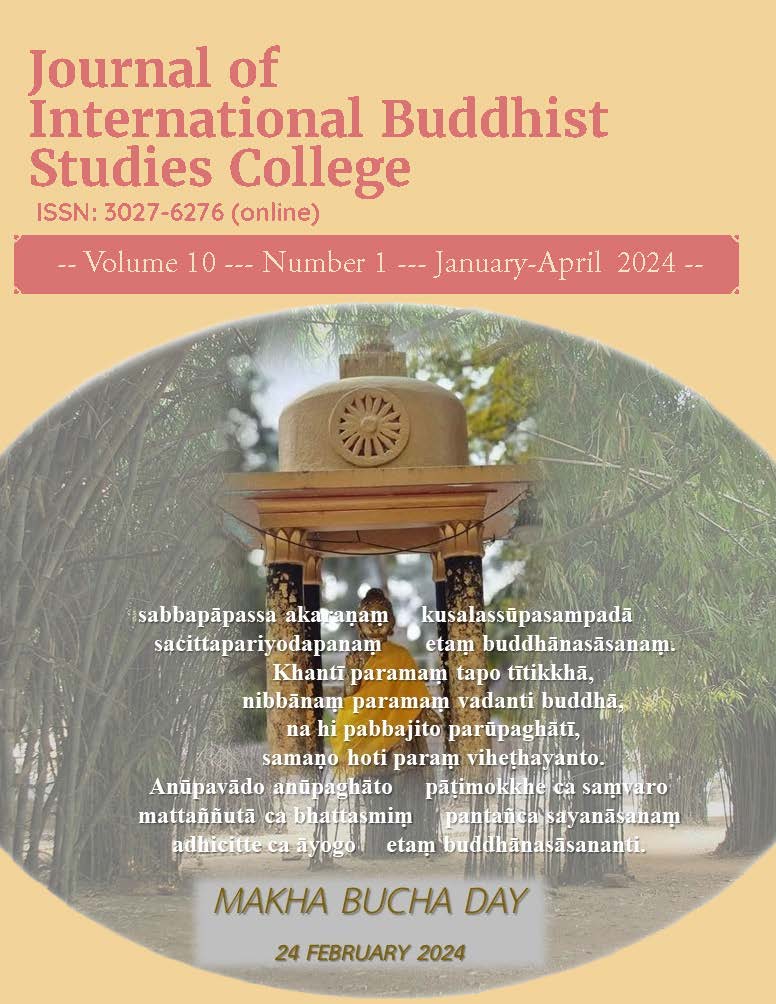An Analytical Study of the Role and Influence of the Most Venerable Thích Trí Tịnh in Propagating Pure Land Buddhism in Vietnam
Main Article Content
Abstract
This article aims to achieve three primary objectives related to Most Ven. Thích Trí Tịnh 1) To study his life and works, 2) To study the propagation of Pure Land Buddhist teachings associated with him, 3) To analyze his role and influence in the dissemination of Pure Land Buddhism within Vietnam. The research methodology employed is documentary research, involving a study of various documents and an analysis of Buddhist texts.
The findings show that the life and works of the Most Venerable Thích Trí Tịnh, who is a great monk and an excellent student and practitioner of the Buddha’s Teaching. Throughout most of his life for sentient beings, he left behind an extremely great work of translating Mahāyāna scriptures for Vietnamese Buddhism. His practice methods and teachings have been adopted and followed by many disciples to practice and achieve happiness in the present. According to his teachings of Pure Land Buddhism faith, vow, and practice are the main teachings, and to achieve good results in daily life vegetarianism practice, sutta chanting, and reciting the Buddha’s name are very valuable. In addition, the practitioner should know how to take advantage of “MOT practice” or free time to practice any day any time to improve oneself better. Regarding his role and influence in propagating Pure Land Buddhism in Vietnam, he left behind an extremely great work of translating Mahayana scriptures for Vietnamese Buddhism. Furthermore, the influence on Vietnamese society, the Sangha community, culture, environment, education, etc., made great contributions. In particular, the pure land practice method that he revised and propagated has become one of the main practice methods in Vietnam to this day.
Article Details
The Journal of TCI is licensed under a Creative Commons Attribution-NonCommercial-NoDerivatives 4.0 International (CC BY-NC-ND 4.0) licence unless otherwise stated. Please read our Policies page for more information on Open Access, copyright and permissions.
References
Bhikkhu Ñanamoli & Bhikkhu Bodhi. (2009). The Middle Discourses of the Buddha: A translation of the Majjhima-Nikāya. Pali Text Society.
Bodhi, B. (1993). A comprehensive manual of Abhidhamma. Buddhist Publication Society.
Bodhi, B. (2012). The Numerical Discourses of the Buddha: A new translation of Anguttara Nikāya. Wisdom Publications.
Buddhadāsa Bhikkhu. (2020). Paṭiccasamuppāda: Practical Dependent Origination. Buddhadāsa Foundation.
Chih I & Ju, T. (1992). Pure Land Buddhism Dialog with ancient masters (3rd ed.). Thich Thien Tam. Buddha Dharma Education Association Inc.
Điển, T. N. (2019). Tư Tưởng Tịnh Độ Tông - Pure Land Thought. United Buddhist Publisher.
Dieu, T. (2014). Praying and chanting sutras (tr.). Nguyen Giac. Hong Duc Publication.
Duc, T. M. (2022). Influence of Buddhism in the cultural life of Vietnamese people. Technium Soc. Sci. J., 34, 690.
Fo Guang Shan International Translation Center. (2017). The Amitābha Sutra as Discoursed by the Buddha (佛說阿彌陀經). Fo Guang Shan International Translation Center.
Gakkai, S. (2009). Dictionary of Buddhism. Motilal Banarsidass Publishers.
Hiền, T. N. (2016). Pháp Môn Tịnh Độ Tại Việt Nam - Pure Land Buddhism in Vietnam. Journal of Buddhist Studies, 30-36.
Hiep, N. D. B. & Mahathanadull, S. (2019). The concept and practices of Mahayana Buddhist vegetarianism in Vietnamese society. The Journal of International Association of Buddhist Universities (JIABU), 12(1), 77–87.
Kuang, P.Y. (1993). Pure-Land Zen: Letters from patriarch Yin Kuang (tr.). Thiền T. T. The Corporate Body of the Buddha Educational Foundation.
Lu, L.T. (2022). Four Noble Truths and Fo Guang entrepreneur. International Journal of Multidisciplinary Research and Analysis 5, 911-915. DOI: 10.47191/ijmra/v5-i5-04.
Ngoc, N. T. M. (2009). Social Activities of Vietnamese Buddhism in Relation to Charity. Religious Studies Review, 3(1,2), 47-63.
Nguyen, T. T. (2024). (Re-) invented Chan Lineage, Unique Vietnamese Meditation School, or Both? Thích Thanh Từ’s “Revived” Trúc Lâm Tradition of Thiền Tông. Religions, 15(3), 352.
Sen, T. (2006). The travel record of Chinese pilgrims Faxian, Xuanzang, and Yijing. Education About Asia, 11(3), 24-33.
Tâm, T.T. (1994). Buddhism of Wisdom and Faith: Pure Land Principles and Practice. The Corporate Body of the Buddha Education Foundation.
Tay, N. V. (2022). The concept of Pure Land Buddhism in Vietnam: The case study of the Great Pure Land Master Thích Thiền Tâm. [Master thesis, Mahachulalongkornrajavid- yalaya University].
Thát, L.M. (1999). Lịch sử phật giáo Việt Nam - History of Vietnamese Buddhism. Thuan Hoa Publishing House.
Thuc, P. T. (2017). The practical method of Pure Land Buddhism in modern society: A case study of Hoang Phap Monastery in Vietnam [Master’s thesis, Graduate School, Mahachulalongkornrajavidyalaya University].
Tịnh, T. T. (1997). Kinh A Di Đà - Amitābha Sutta. Hong Duc Publishing House.
Tịnh, T. T. (2010). Kinh Diệu Pháp Liên Hoa - Wonderful Law Lotus Flower. Hà Nội Religion Publishing House.
Tịnh, T. T. (2014a). Hương sen vạn đức - The inconceivable virtuous of lotus. Hong Duc Publishing House.
Tịnh, T. T. (2014b). Đường Về Cực Lạc - The path go to the Pure Land. Hà Nội Religion Publishing House.
Tịnh, T. T. (2014c). Chỉ rõ công phu Niệm Phật - An elaborate on the practice of Reciting Buddha’s Name. Hong Duc Publishing House.
Vuontam. (2024). Lời vàng của Hòa Thượng Thích Trí Tịnh để lại cho đời - Ten Maxim of the Most Venerable Thích Trí Tịnh Left for Human beings. http://vuontam.net/gieo-duyen-voi-phat/5-phut-hoc-phat/loi-vang-cua-hoa-thuong-thich-tri-tinh-de-lai-cho-doi.html.


